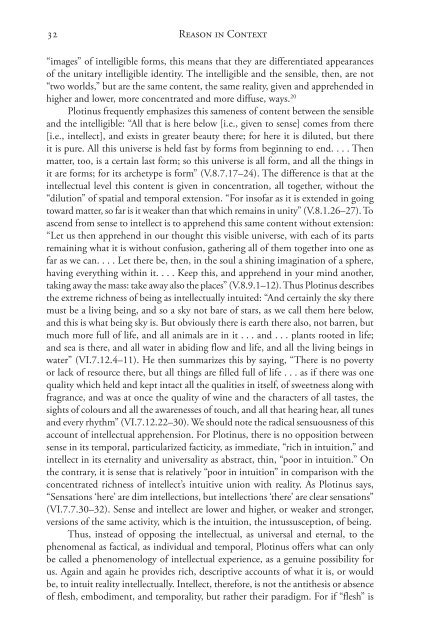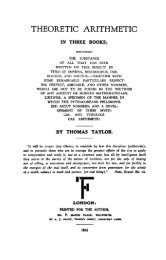Perl - The Good of the Intellect.pdf - Platonic Philosophy
Perl - The Good of the Intellect.pdf - Platonic Philosophy
Perl - The Good of the Intellect.pdf - Platonic Philosophy
Create successful ePaper yourself
Turn your PDF publications into a flip-book with our unique Google optimized e-Paper software.
32<br />
Reason in Context<br />
“images” <strong>of</strong> intelligible forms, this means that <strong>the</strong>y are differentiated appearances<br />
<strong>of</strong> <strong>the</strong> unitary intelligible identity. <strong>The</strong> intelligible and <strong>the</strong> sensible, <strong>the</strong>n, are not<br />
“two worlds,” but are <strong>the</strong> same content, <strong>the</strong> same reality, given and apprehended in<br />
higher and lower, more concentrated and more diffuse, ways. 20<br />
Plotinus frequently emphasizes this sameness <strong>of</strong> content between <strong>the</strong> sensible<br />
and <strong>the</strong> intelligible: “All that is here below [i.e., given to sense] comes from <strong>the</strong>re<br />
[i.e., intellect], and exists in greater beauty <strong>the</strong>re; for here it is diluted, but <strong>the</strong>re<br />
it is pure. All this universe is held fast by forms from beginning to end. . . . <strong>The</strong>n<br />
matter, too, is a certain last form; so this universe is all form, and all <strong>the</strong> things in<br />
it are forms; for its archetype is form” (V.8.7.17–24). <strong>The</strong> difference is that at <strong>the</strong><br />
intellectual level this content is given in concentration, all toge<strong>the</strong>r, without <strong>the</strong><br />
“dilution” <strong>of</strong> spatial and temporal extension. “For ins<strong>of</strong>ar as it is extended in going<br />
toward matter, so far is it weaker than that which remains in unity” (V.8.1.26–27). To<br />
ascend from sense to intellect is to apprehend this same content without extension:<br />
“Let us <strong>the</strong>n apprehend in our thought this visible universe, with each <strong>of</strong> its parts<br />
remaining what it is without confusion, ga<strong>the</strong>ring all <strong>of</strong> <strong>the</strong>m toge<strong>the</strong>r into one as<br />
far as we can. . . . Let <strong>the</strong>re be, <strong>the</strong>n, in <strong>the</strong> soul a shining imagination <strong>of</strong> a sphere,<br />
having everything within it. . . . Keep this, and apprehend in your mind ano<strong>the</strong>r,<br />
taking away <strong>the</strong> mass: take away also <strong>the</strong> places” (V.8.9.1–12). Thus Plotinus describes<br />
<strong>the</strong> extreme richness <strong>of</strong> being as intellectually intuited: “And certainly <strong>the</strong> sky <strong>the</strong>re<br />
must be a living being, and so a sky not bare <strong>of</strong> stars, as we call <strong>the</strong>m here below,<br />
and this is what being sky is. But obviously <strong>the</strong>re is earth <strong>the</strong>re also, not barren, but<br />
much more full <strong>of</strong> life, and all animals are in it . . . and . . . plants rooted in life;<br />
and sea is <strong>the</strong>re, and all water in abiding flow and life, and all <strong>the</strong> living beings in<br />
water” (VI.7.12.4–11). He <strong>the</strong>n summarizes this by saying, “<strong>The</strong>re is no poverty<br />
or lack <strong>of</strong> resource <strong>the</strong>re, but all things are filled full <strong>of</strong> life . . . as if <strong>the</strong>re was one<br />
quality which held and kept intact all <strong>the</strong> qualities in itself, <strong>of</strong> sweetness along with<br />
fragrance, and was at once <strong>the</strong> quality <strong>of</strong> wine and <strong>the</strong> characters <strong>of</strong> all tastes, <strong>the</strong><br />
sights <strong>of</strong> colours and all <strong>the</strong> awarenesses <strong>of</strong> touch, and all that hearing hear, all tunes<br />
and every rhythm” (VI.7.12.22–30). We should note <strong>the</strong> radical sensuousness <strong>of</strong> this<br />
account <strong>of</strong> intellectual apprehension. For Plotinus, <strong>the</strong>re is no opposition between<br />
sense in its temporal, particularized facticity, as immediate, “rich in intuition,” and<br />
intellect in its eternality and universality as abstract, thin, “poor in intuition.” On<br />
<strong>the</strong> contrary, it is sense that is relatively “poor in intuition” in comparison with <strong>the</strong><br />
concentrated richness <strong>of</strong> intellect’s intuitive union with reality. As Plotinus says,<br />
“Sensations ‘here’ are dim intellections, but intellections ‘<strong>the</strong>re’ are clear sensations”<br />
(VI.7.7.30–32). Sense and intellect are lower and higher, or weaker and stronger,<br />
versions <strong>of</strong> <strong>the</strong> same activity, which is <strong>the</strong> intuition, <strong>the</strong> intussusception, <strong>of</strong> being.<br />
Thus, instead <strong>of</strong> opposing <strong>the</strong> intellectual, as universal and eternal, to <strong>the</strong><br />
phenomenal as factical, as individual and temporal, Plotinus <strong>of</strong>fers what can only<br />
be called a phenomenology <strong>of</strong> intellectual experience, as a genuine possibility for<br />
us. Again and again he provides rich, descriptive accounts <strong>of</strong> what it is, or would<br />
be, to intuit reality intellectually. <strong>Intellect</strong>, <strong>the</strong>refore, is not <strong>the</strong> anti<strong>the</strong>sis or absence<br />
<strong>of</strong> flesh, embodiment, and temporality, but ra<strong>the</strong>r <strong>the</strong>ir paradigm. For if “flesh” is
















